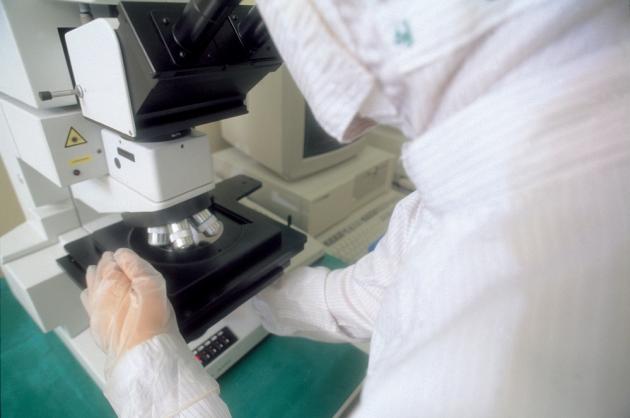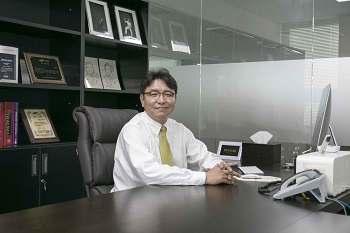Korea’s New Candidate Drug Watch List ① Gemvax & KAEL GV1001
GV1001, developed by GemVax & KAEL, one of Korea’s emerging biotechnology companies developing new drugs, is a peptide drug derived from a telomerase.
Developed initially as a telomerase immunotherapeutic drug that treats cancer, the drug has recently received international spotlight as the company expanded its indications to other areas such as Alzheimer’s disease and benign prostatic hyperplasia (BPH).

Regarding its original implication, the drug has completed phase 3 clinical trial for pancreatic cancer in the U.K. and is conducting its local phase 3 clinical trials on GV1001 with Gemcitabine/Capecitabine combination- treatment vs. Gemcitabine/Capecitabine single-treatment in advanced and metastatic pancreatic cancer patients.
The drug has also received conditional approval for pancreatic cancer treatment from the Ministry of Food and Drug Safety (MFDS) on Sep. 15, 2014. It is being marketed under the brand name RIAVAX in Korea.
Recently, the drug demonstrated the possibility of additional implications in treating kidney cancer patients.
In an in-vitro study, Professor Lee Ji-youl from the department of urology at Seoul St. Mary’s Hospital confirmed that GV1001 reduces the viability of human kidney cancer cells, while inducing apoptosis. During the research, his team proved that the drug-induced death in cancer cells by reducing expression of HIF-1α, VEGF and PDGF appearance in mice transplanted with kidney cancer cells.
The company is also conducting clinical trials for Alzheimer’s disease. “Dementia patients are increasing in Korea because population aging,” the company said. “With 50 to 70 percent of dementia patients who have Alzheimer’s disease, socioeconomic costs are soaring as there have been no fundamental dementia treatments.”
According to data published by Zion Research Market, an Indian market research company, the Alzheimer’s drugs market is set to reach $5.09 billion by 2022. The company is taking domestic phase 2 clinical tests in Korea and is preparing for a clinical trial in the U.S., too.

The company expects that the drug will succeed as a treatment for Alzheimer's disease as it inhibits the accumulation of amyloid beta and suppresses the condensation of tau protein, which prevents the inflammation in neurons. Neural stem cells damaged by amyloid beta are known to be the cause of Alzheimer's.
During a related non-clinical trial, the research team led by Professor Koh Seong-ho of the department of neurology at Hanyang University Hospital confirmed that Fe-GV1001, when used to treat neural stem cells damaged by amyloid beta, migrates into the mitochondria with essential functions such as cell protection and repair. The company expects that such results will provide a valuable clue to explain the mechanism of Alzheimer's and thus helping the development of the drug.
For BPH, the company has already confirmed the safety and efficacy of the drug by finishing domestic phase 2 clinical trials. According to Globaldata, a U.K. based market research firm, the BPH market will reach $4.49 billion by 2024.
The phase 2 study evaluated the safety and efficacy of GV1001 in 161 patients with the disease for 12 weeks and found no significant side effects such as a decrease in sexual functions.
The company plans to run phase 3 clinical trials in Korea within this year while preparing for global phase 2 clinical trials.
The company is also expanding other implications of GV-1001. GemVax & KAEL has proved other possible areas such as treating hearing impairment caused by drugs and protecting heart muscles from reperfusion injury after ischemia.
The company said it plans to continue to develop the GV1001 into a global blockbuster drug by following regulations and principles instead of taking shortcuts.
|
<Interview with the CEO: Song Hyoung-gon>
Question: What is the background behind the development of GV1001? Answer: In the 1990s, Professor Gustav Gaudernack of the Radium Hospital in Norway developed GV1001 as anti-cancer immunotherapy. After its development, GemVax AS started conducting several clinical trials of GV1001 on liver and pancreatic cancer patients in Europe. In 2008, the company’s subsidiary KAEL-GemVax took over the Norwegian cancer vaccine company, GemVax AS, and gained rights to GV1001. GV1001 is a peptide drug derived from a telomerase which plays an essential role in preventing damage to chromosomes in the human body and preventing cell death due to aging. Based on the anti-cancer immune-related functions of the telomerase, we have developed RIAVAX, a pancreatic cancer immunotherapeutic drug, and Korea’s 21st new drug. The company is currently conducting research and development (R&D) on BPH and Alzheimer's disease based on the functions of GV1001, so-called extra-telomeric functions, other than anti-cancer immune-related functions. Q: What are the advantages of the company's GV1001 and what are its differences from existing treatments? A: GV1001 has no side effects as it is a telomerase-derived peptide that comes from the human body. More than 1,800 patients have received GV1001 in various clinical trials to date, but the company has seen no serious adverse effects. Q: GV1001 is currently undergoing clinical studies with many indications in mind. So how is the process going for the drug to be commercialized? A: In the case of pancreatic cancer, a domestic phase 3 clinical trial is underway, and we also plan to change the conditional approval on RIAVAX to win approval until the end of next year. For BPH the company aims to start a domestic phase 3 clinical trial during the first half of this year and commercialize it by 2022 at the earliest. Finally, for Alzheimer's disease, the company is currently conducting domestic phase 2 clinical trials and is preparing for phase 3 clinical trials, with plans to launch the drug by 2021. If conditional authorization for the ongoing phase 2 clinical trials for rare, intractable diseases is possible, we hope that the commercialization of the drug will come sooner. We are also preparing for a global clinical trial with the goal of receiving U.S. Food and Drug Administration’s approval of our investigational new drug (IND) application this year for Alzheimer’s disease. Q: Other pharmaceutical companies or specialists have pointed out that GV1001 has undergone too many clinical trials with other indications even though it was developed as an immunotherapeutic agent. On which area does your company place a priority? A: GV1001 has proved that it has extra-telomeric functions such as anti-inflammatory, anti-aging, and antioxidant as well as its intended immunotherapy effects through numerous clinical trials and non-clinical trials. The initial R&D of GV1001 confirmed the immunotherapy functions, which led to the development of RIAVAX. However, this does not mean that such indication encompasses all of GV1001’s therapeutic benefits. Apart from the anti-cancer immune-related functions, GV1001 has other vital functions that have become the baseline of R&D into BPH and Alzheimer's. There are allegations that GV1001 will become meaningless since it is portrayed as a “panacea” medicine. However, such allegations are only made by those that do not recognize the various therapeutic benefits that GV1001 possess besides anti-cancer immune-related effects. GemVax & KAEL puts a focus on becoming a world’s leading peptide-based new drug development company. Q: Are there any other candidate drugs that have high potential other than GV1001? A: In addition to GV1001, we have about 300 candidate peptides derived from telomerase. The company is researching 20 to 30 of these candidates. |


